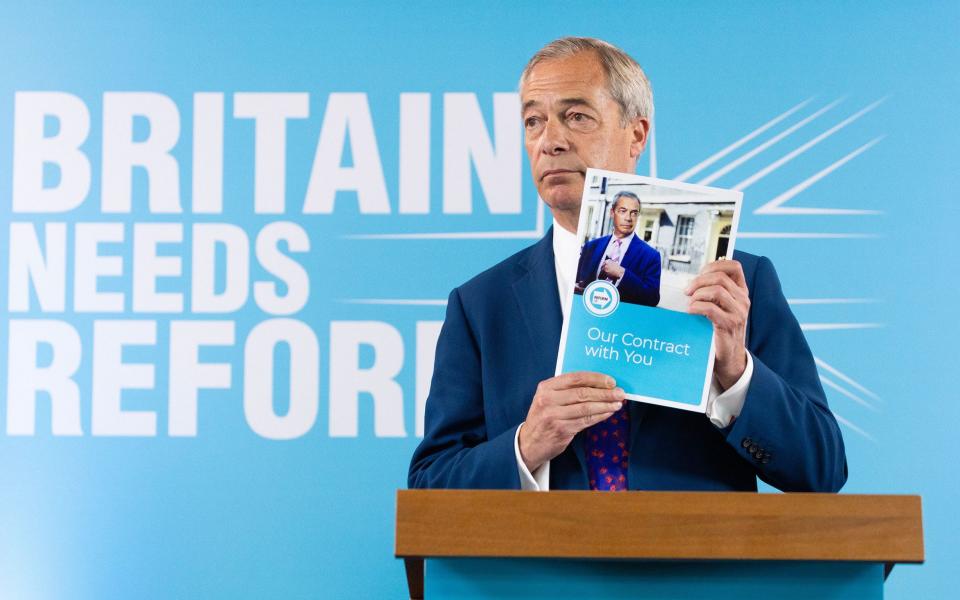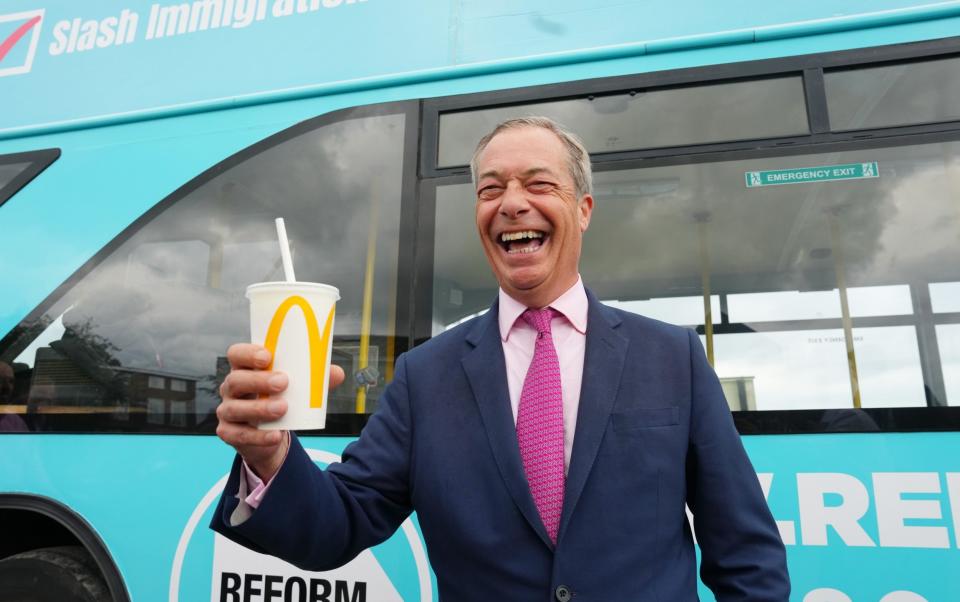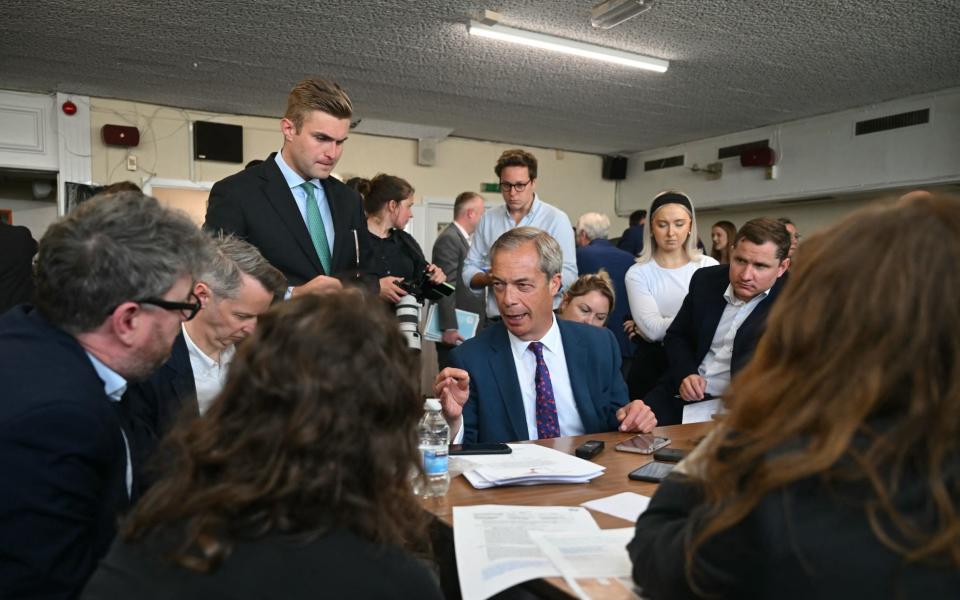Reform UK manifesto: Nigel Farage’s key policies at a glance

Reform UK released its “contract with the people” on Monday, as Nigel Farage set out his party’s vision to repair a “skint” UK.
The party leader vowed to boost economic growth by increasing the income tax threshold from £12,570 to £20,000 and introduce an immigration tax forcing employers to pay an increased National Insurance rate of 20 per cent for every foreign employee.
The party has also said it will end illegal immigration and vastly reduce legal migration by leaving the European Convention on Human Rights (ECHR) and introducing a “one in, one out” migration quota.
The insurgent Right-wing party is on course to cost the Conservatives dearly at the general election on July 4, and has refused to stand down its candidates to help the Prime Minister.
Mr Farage’s surprise decision to take over the Reform leadership from Richard Tice has hit the Tories hard in the polls. One YouGov poll has placed Reform UK one point ahead of the Conservatives for the first time and Survation data suggests the party is likely to win in seven constituencies.
The former Brexit party leader said he would be willing to lead a merged Reform-Conservative party in an interview with LBC on June 13.
The party has come a long way since scoring its first MP in March and remains steadfast against stepping aside for the Tories – unlike the Brexit Party in 2019 – even if this were to result in a Labour government.
Mr Farage revealed the party’s policies on Monday, but refused to call the document a manifesto.
He said previously, at a press conference in London: “We won’t call it a manifesto because in most people’s minds manifesto equals lie.”
Here is a summary of Reform’s “contract with the people”:

NHS and social care
Cut NHS waiting lists to zero in two years
Income tax exemption for front-line workers
Tax relief on private healthcare and insurance
Public inquiry into excess Covid deaths and vaccine harm
Review of all NHS private contracts
Adopt French-style healthcare system
Reform would aim to cut NHS waiting lists to zero in the space of two years, an objective it has described as “challenging but achievable”.
It promises to exempt two million front-line healthcare and social care workers from the basic rate of income tax for three years as part of a push to retain existing staff and ensure the return of former staff.
NHS patients would receive a voucher for fully-funded private treatment if they could not see a GP within three days, a consultant within three weeks, or have an operation in nine weeks.
Tax relief of 20 per cent would be introduced on all private healthcare and insurance, with more private healthcare providers used by the NHS to drive waiting list numbers down.
Reform would also hold a public inquiry into both excess deaths and Covid vaccine harms after figures from the statistics watchdog showed thousands more people died in 2023 than expected. Government health advisers have said coronavirus vaccines saved countless lives and are recommended for the vulnerable, a view supported by many independent scientists.
Reform said its healthcare plan would cost £15 billion a year for two years, funded by reorganising Bank of England quantitative easing debt into 75-year bonds. The Bank of England would no longer pay interest on quantitative easing reserves for commercial banks, which Reform says would raise billions.
All NHS private contracts would be reviewed as part of a drive to “cut waste, bureaucracy and unnecessary managers”.
In the first seven-party television debate on June 7, party leader Mr Farage suggested the UK adopt a French-style healthcare system.
He said that in France “those who can afford it through their taxes pay into an insurance scheme”, while “those that can’t afford it, don’t pay in, so it’s for the mutual benefit of everybody.”
In France, all residents must have some form of health insurance, whether state or private. The state system covers everyone regardless of income level or employment status, with healthcare partly funded through social security contributions.
Tax and spending
Raise minimum income tax threshold
Scrap stamp duty on properties under £750,000
Inheritance tax abolished for estates under £2 million
Scrap VAT on energy bills
Reduce Government spending
Half foreign aid budget
The tax burden has become one of Reform’s key attack lines in the wake of tax rises under the Conservatives that have seen the overall burden reach its highest level since the Second World War.
Reform would raise the minimum income tax threshold from £12,571 to £20,000, exempting six million people from having to pay income tax, while raising the higher 40p rate threshold from around £50,000 to £70,000.
Stamp duty would be scrapped for properties valued less than £750,000 – three times the current £250,000 threshold – and inheritance tax would be “abolished” for all estates worth under £2 million. Currently, only estates worth less than £325,000 are exempt.
It would scrap VAT on energy bills, saving households £100 per year, while lowering fuel duty by 20p per litre and reducing VAT from 20 per cent to 18 per cent. It calculates that these measures would save £240 per driver and £300 per household per year.
Government spending would be reduced by £5 in every £100, amounting to £50 billion a year.
Reform says it would save £6 billion a year by halving the foreign aid budget.
Economy
Reduce corporation tax
Abolish IR35 rules
Scrap business rates for small and medium firms
Raise VAT threshold
Reform has said it would reduce the main corporation tax rate from 25 per cent to 20 per cent and raise the threshold for paying the tax from £50,000 to £100,000.
Its other proposals for the economy include the abolition of IR35 rules - regulations introduced by the Conservatives in recent years to govern off-payroll working.
Business rates would be scrapped for small and medium firms, while an online delivery tax, levied at 3 per cent, is intended to “create a fairer playing field” for high-street businesses versus online competitors.
The VAT threshold would be raised to £120,000 to “free small entrepreneurs from red tape”.
Environment
Nationalise utility companies
Fast track brownfield development sites
Increase farming budget
Rebuild fishing processes
Reform has insisted “we all care about the environment” and promised to achieve cleaner air in a “strategic, affordable way”.
It would nationalise 50 per cent of key utility companies, such as energy and water giants, “to stop consumers being ripped off”.
New housing on brownfield sites would be fast tracked as part of sweeping reforms to the planning system, with a particular emphasis on new homes in the North, as well as coastal regeneration areas.
Reform would increase the farming budget to £3 billion, with young people encouraged into farming and an end to all climate-related farming subsidies. Hunting and shooting would be protected on the grounds “they boost rural jobs, communities and local economies”.
Fish processing in the UK would be rebuilt, a coastal fund similar to a sovereign wealth fund launched, and foreign supertrawlers banned from UK waters.

Energy and net zero
Abandon existing carbon emission targets
Accelerate North Sea oil and gas licences
Scrap annual green energy subsidies
Speed up clean nuclear energy
Reform insist the UK’s flagship green goals make taxpayers worse off and would abandon all existing carbon emissions targets if elected, a move it estimates would save the taxpayer £20 billion per year and “possibly more” for the next 25 years.
The party plans to accelerate oil and gas licences in the North Sea, build high-efficiency combined cycle gas turbines and restart coal mines “using the latest cleanest techniques”. Further to this, shale gas licences would be granted across test sites for two years.

Clean nuclear energy would also be sped up through the use of new small, modular reactors, built in Britain, while domestic lithium mining would increase to reduce overseas dependence on electric batteries. An annual £10 billion of green energy subsidies would be scrapped.
Reform’s policy document reads: “We all want technology to do our bit. But net zero is the wrong bit, at the wrong time, in the wrong time frame. Westminster’s obsession with net zero is damaging our livelihoods… It is costing tens of thousands of jobs and increasing inflation.”
Education and childcare
Scrap student loan interest
Ban teaching gender ideology and critical race theory
Introduce political bias or cancel culture fines for universities
Tax relief for private schools
Introduction of Home Economics
Double pupil referral units
Make school curriculum more ‘patriotic’
Reform would require universities to provide two-year courses to reduce student debt and allow graduates to enter the workforce earlier. Interest on student loans would be scrapped to stop students being “ripped off” – the party declares that many courses “are simply not good enough”.
It would use its first 100 days in power to clamp down on “woke ideology” in schools and universities, banning the teaching of contested gender ideology and critical race theory in schools, with children instead taught “there are two sexes and two genders”.
Any universities that “allow political bias or cancel culture” would face “heavy” fines.
Private schools would benefit from tax relief of 20 per cent in an attempt to take pressure off state schools and “improve education for all”. The party has also pledged to fight Labour’s planned tax raid on private education as Mr Tice vowed to challenge the “discriminatory” policy in the courts.
Reform would place a greater emphasis on life skills by adding Home Economics and classes about the risks of social media to the national curriculum. It would seek to increase technical courses and apprenticeships, particularly in IT, construction and engineering.
The number of pupil referral units for violent or disruptive students would double “so schools can function safely” while supporting vulnerable children. Smartphones and the use of social media would be banned in schools for pupils under the age of 16.
Reform says it would review the school curriculum to make it more “patriotic”. The manifesto states: “Any teaching about a period or example of British or European imperialism or slavery must be paired with the teaching of a non-European occurrence of the same to ensure balance.”
Key figures in Reform UK

Nigel Farage
Party leader

David Bull
Deputy leader & TV presenter

Richard Tice
Chairman

Anne Widdecombe
Former Tory minister
Defence
Invest in housing for Armed Forces
Upgrade Office for Veterans’ Affairs
Free education for troops and veterans
Basic pay increase
New Armed Forces Justice Bill
Increase defence spending
Recruit 30,000 new soldiers
Reform would overhaul the military procurement process as one of its defence priorities while also promising to invest in “properly equipping and housing” Armed Forces personnel.
It would upgrade the existing Office for Veterans’ Affairs to a fully-fledged Department for Veterans’ Affairs, which would receive £1 billion funding a year.
Troops and veterans alike would be entitled to free education during and after their service, with Reform saying this is “vital to ensure a successful return to civilian life”.
Basic pay would be increased across the forces, with the pre-manifesto adding: “It is unacceptable that a private soldier is paid less than an Amazon worker.”
A new Armed Forces Justice Bill would protect serving military personnel in the UK and abroad from civil law and human rights lawyers, while also creating an armed forces watchdog to fast-track complaints about military accommodation and welfare for veterans.
Defence spending, which is currently on track to reach 2.25 per cent next year, would increase to 2.5 per cent by 2027 before rising to 3 per cent by 2030.
The manifesto also states that Reform would recruit 30,000 new full-time soldiers for the Army.

Pensions and welfare
Back-to-work push
Withdraw jobseekers’ benefits
Face-to-face PIP assessments
Remodel savings and pension system
Mr Farage’s party wants to get two million people back into work and would launch a wide-ranging suppression on welfare in order to achieve this, with a back-to-work push that places particular emphasis on those aged 16 to 34.
Benefits for jobseekers would be withdrawn either after four months of unemployment or the rejection of two job offers.
Assessment for personal independence payment (PIP) would have to take place face-to-face to build relationships and coach people back into work, while medical assessments for those on benefits would be required to take place independently.
A royal commission to tackle social care is among “critical reforms” to the social care system the party is seeking to deliver in the first 100 days after the election. A loophole that it says allows larger care home providers to avoid tax through offshore structures would be closed.
Reform has said it wants to improve the savings and pension system in the long term to make it “much better and cheaper, from a much younger age”, citing Australia as a model.

Policing and crime
Increase police numbers
Enforcement of “zero tolerance” policing
Review of police leadership teams
Abolish all diversity, equality and inclusion roles and regulations
Automatic life imprisonment for violent offenders
High intensity training camps for young offenders
Deport child groomers with dual nationality
Reform has accused the Government of being “soft on crime” and paints a picture of “badly failing” police leadership, citing a collapse in charging rates to around 5 per cent.
Its immediate law and order objectives include the start of an increase in police numbers that would see 40,000 new officers over the course of a five-year parliament.
“Zero tolerance” policing, which the party said has been a success in New York, would mean offenders received jail sentences for all violent crimes and the possession of a knife. A new offence of substantial possession of drugs would lead to heavy fines, while the use of stop-and-search would be vastly expanded, with Reform hailing it as a “proven deterrent to knife crime”.
Police leadership teams would be reviewed and where necessary replaced, with a “strong preference” for military veterans.
All diversity, equality and inclusion roles and regulations would be abolished in an attempt to stop what Mr Tice referred to in his spring conference speech as “two-tier policing”.
Police and Crime Commissioners would either be scrapped or reformed – “either they get the power to make a real change or they should go” – and degree-standard entry would be replaced with entrance exams, while officers would have to complete two years of probation.
Violent offenders would receive automatic life imprisonment as part of an urgent review.
The definition of hate crime would be changed in order to require “proper evidence”, pro-Palestine marches banned using existing powers, 10,000 new detention places created and the budget of the National Crime Agency increased to tackle foreign gang crime.
Young offenders, meanwhile, would face high intensity training camps that would reopen to offer “basic education, training and values… [This model] is needed more than ever.”
Reform UK also wants to cut down on cash-only barbershops, which the party claims are a front for money laundering after experts and senior industry figures warned some of the traders engage in illegal activity and undercut honest traders in communities.
The Reform manifesto states that “foreign gang crime” accounts for most organised crime in the UK at a cost of £37 billion per year, adding: “This includes drugs, people trafficking and money laundering through barbershops, car washes and nail bars.”
The party has pledged to ensure there are more bobbies on the beat in local communities and to enforce higher standards of fitness in the police.
It has also unveiled plans to deport child groomers who have dual nationality.
Migration
Immigration tax
Leave European Convention on Human Rights
Freeze ‘non-essential’ migration
Abolish Home Office
Reduce student visas
Ban new arrivals from receiving benefits
The party have pledged to introduce an immigration tax forcing employers to pay an increased National Insurance rate of 20 per cent for every foreign employee, compared with the current 13.8 figure for domestic staff.
Writing in The Telegraph, Mr Tice said the tax would incentivise companies to recruit British workers over cheaper foreign labour and provide the “antidote” to 14 years of Tory failures to curb net migration.
The party also said it will end illegal immigration and vastly reduce legal migration by leaving the European Convention on Human Rights (ECHR), introducing a “one in, one out” migration quota.
All “non-essential” migration would be frozen within weeks. Illegal migration would be deemed a national security threat, migrants would be picked up out of boats and taken back to France and the Home Office abolished and replaced by a new Department for Immigration.
Foreign criminals would be deported immediately after their prison sentences end and citizenship withdrawn from immigrants who commit “significant” crimes.
A proposed clamp down on student visas and their dependants is designed to mean that only students with essential skills can remain in the UK as soon as their studies end.
Under Reform’s plans, “significant” penalties would be levelled on companies that make use of undocumented and illegal labour.
The manifesto also includes a ban on newly arrived migrants receiving benefits. It states: “We will impose a requirement of 5 years residency and employment to claim any benefits in the UK.”
Brexit
Axe all remaining EU laws
Scrap the Windsor Framework
Renegotiate Brexit trade deal
Reform’s manifesto includes a commitment to axe all of the 6,700 EU laws still on the British statute books.
The party says that this is required because UK rules on state aid, competition, employment, net zero and the environment are still effectively derived from Brussels.
It also commits to ripping up the Windsor Framework, the deal which was struck between Britain and the EU to avoid a hard border between Ireland and Northern Ireland, which has left the latter in the EU’s single market. “It is unacceptable that British citizens in Northern Ireland are being ruled by EU laws,” the manifesto states.
Reform says it would also prepare for talks with Brussels over renegotiating the whole Brexit trade deal which it says has left Britain tied to EU rules and “is holding us back”.
Families
Marriage tax allowance on income up to £25,000
‘Frontload’ benefits system to allow mothers to stay at home
Promote development of child-friendly smartphones
Inquiry into social media harms
Reform has unveiled a series of family friendly tax-and-spend policies designed to encourage marriage and the having of children.
They include a 25 per cent marriage tax allowance, which would mean no income tax was charged on the first £25,000 of income for either spouse.
The party also wants to “frontload” the benefits system for children aged one to four so that more parents can choose to stay at home.
Reform says it would also promote the development of child-friendly smartphones, which are restricted to only having certain apps, to tackle rising mental health issues amongst the young.
It would also launch an inquiry into social media harms as well as going after online giants that push “baseless transgender ideology and divisive Critical Race theory”.
Transport
Scrap HS2
Ban Ulez
Axe 2035 ban on sale of new petrol and diesel cars
Outlaw creation of 20mph zones
Bring 50 per cent of utilities companies into public ownership
Reform says that in its first 100 days it would scrap the “bloated” HS2 high speed train line between London and Birmingham, saving £25 billion.
It would also “stop the war on drivers” by introducing a ban on ultra-low emission zones – like the one in London – and Low Traffic Neighbourhoods.
The party would also axe the proposed 2035 ban on the sale of new petrol and diesel cars and outlaw the creation of 20mph zones.
In the longer term it would prioritise the improvement of existing transport infrastructure and launch a plan to bring 50 per cent of all utilities companies into public ownership.
Constitution and culture
Scrap the TV licence
Introduce free speech bill to prevent political bias in public institutions
Make St George’s day a bank holiday
Make the House of Lords more democratic
Reform postal voting to tackle fraud
Quit the WHO unless it underwent fundamental restructuring
Reform’s manifesto includes a commitment to scrap the £170 a year television licence and to reform the “institutionally biased” and “out-of-touch” BBC.
The party would also introduce a new free speech bill to “stop Left-wing bias and politically correct ideology that threatens personal freedom and democracy”.
The manifesto adds: “No more de-banking, cancel culture, left wing hate mobs or political bias in public institutions. Stop Sharia law being used in the UK.”
Elsewhere it would make St George’s day a bank holiday and would reform both the Lords, to make it more democratic, and postal voting to tackle fraud.
Reform says it would reject the World Health Organisation’s pandemic treaty and quit the organisation itself “unless there is fundamental reform to its structure and funding”.


 Yahoo News
Yahoo News 
